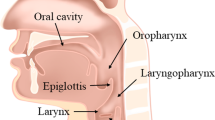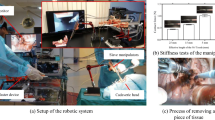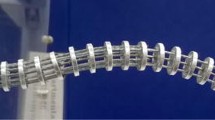Abstract
Head and neck surgeries require skilled surgeons to avoid facial nerves and blood vessels. Using straight surgical instruments to create a deep and sealed operating environment is difficult. Continuum robots are particularly effective in head and neck surgery due to their extensive range of motion, adaptability, and ability to navigate confined anatomical spaces. This paper presents a new approach to examine the flexibility of the continuum robot in head and neck surgery, motivated by the advantages of continuum robots. This method uses a discretized kinematics model with a constant curvature and a piecewise assumption-fitting-approximation (PFA) method to find closed solutions for the continuum robot’s problem. We introduced the concept of spatial solid angle to assess the dexterity of the continuum robot, utilizing the inverse solution of the target point position as a reference. An intuitive dexterity index and dexterity area were proposed. The length of the continuum segment was optimized by simulation, and the efficacy of the approach was then validated through experiments. Experiments demonstrate that the piecewise assumption can cause the dual-section continuum robot to deform as expected. In comparison to previous similar tasks, the robot has exceptional position accuracy, with a position error of only \(1.72\%\) of the overall length. Additionally, it exhibits excellent real-time performance, with a maximum time consumption of 3.9 ms.














Similar content being viewed by others
Data availability
The data used to support the findings of this study are available from the corresponding author upon request.
References
Robinson, G., Davies, J.B.C.: Continuum robots-a state of the art. In: Proceedings 1999 IEEE International Conference on Robotics and Automation (Cat. No. 99CH36288C), vol. 4, pp. 2849–2854 . IEEE(1999)
Burgner-Kahrs, J., Rucker, D.C., Choset, H.: Continuum robots for medical applications: a survey. IEEE Trans. Robot. 31(6), 1261–1280 (2015)
Wang, H., Wang, X., Yang, W., Du, Z.: Design and kinematic modeling of a notch continuum manipulator for laryngeal surgery. Int. J. Control Autom. Syst. 18, 2966–2973 (2020)
Webster, R.J., III., Kim, J.S., Cowan, N.J., Chirikjian, G.S., Okamura, A.M.: Nonholonomic modeling of needle steering. Int. J. Robot. Res. 25(5–6), 509–525 (2006)
Shang, J., Payne, C.J., Clark, J., Noonan, D.P., Kwok, K.-W., Darzi, A., Yang, G.-Z.: Design of a multitasking robotic platform with flexible arms and articulated head for minimally invasive surgery. In: 2012 IEEE/RSJ International Conference on Intelligent Robots and Systems, pp. 1988–1993 . IEEE (2012)
Bruns, T.L., Remirez, A.A., Emerson, M.A., Lathrop, R.A., Mahoney, A.W., Gilbert, H.B., Liu, C.L., Russell, P.T., Labadie, R.F., Weaver, K.D.: A modular, multi-arm concentric tube robot system with application to transnasal surgery for orbital tumors. Int. J. Robot. Res. 40(2–3), 521–533 (2021)
Bergeles, C., Gosline, A.H., Vasilyev, N.V., Codd, P.J., Del Nido, P.J., Dupont, P.E.: Concentric tube robot design and optimization based on task and anatomical constraints. IEEE Trans. Robot. 31(1), 67–84 (2015)
Yang, F., Alkebsi, K., Chen, S., Lubamba, G.P., Xiao, L., Wang, X.-Y., Li, L.-J., Li, C.-J., Zhu, G.-Q.: Gasless endoscopic submandibular gland excision through hairline approach. J. Craniofac. Surg. 34(5), 1563–1569 (2023)
Chen, S., Alkebsi, K., Xuan, M., Wang, X.-Y., Li, L.-J., Li, C.-J., Zhang, Z., Zhu, G.-Q.: Single incision-plus approach for gasless endoscopic parotidectomy: a seven-step procedure. Transl. Cancer Res. 11(7), 2462 (2022)
Ma, X., Wang, X., Zhang, Z., Zhu, P., Cheng, S.S., Au, K.W.S.: Design and experimental validation of a novel hybrid continuum robot with enhanced dexterity and manipulability in confined space. IEEE/ASME Trans. Mechatron. 28(4), 1826–1835 (2023). https://doi.org/10.1109/TMECH.2023.3276076
Wu, L., Crawford, R., Roberts, J.: Dexterity analysis of three 6-DoF continuum robots combining concentric tube mechanisms and cable-driven mechanisms. IEEE Robot. Autom. Lett. 2(2), 514–521 (2016)
Wang, J., Lau, H.Y.: Dexterity analysis based on Jacobian and performance optimization for multi-segment continuum robots. J. Mech. Robot. 13(6), 061012 (2021)
Zhang, G., Du, F., Xue, S., Cheng, H., Zhang, X., Song, R., Li, Y.: Design and modeling of a bio-inspired compound continuum robot for minimally invasive surgery. Machines 10(6), 468 (2022)
Zhang, H.J., Giamou, M., Marić, F., Kelly, J., Burgner-Kahrs, J.: Cidgikc: distance-geometric inverse kinematics for continuum robots (2023). arXiv preprint arXiv:2306.13617
Singh, I., Lakhal, O., Amara, Y., Coelen, V., Pathak, P.M., Merzouki, R.: Performances evaluation of inverse kinematic models of a compact bionic handling assistant. In: 2017 IEEE International Conference on Robotics and Biomimetics (ROBIO), pp. 264–269 . IEEE (2017)
Xu, K., Simaan, N.: Analytic formulation for kinematics, statics, and shape restoration of multibackbone continuum robots via elliptic integrals. J. Mech. Robot. 2(1), 011006 (2010). https://doi.org/10.1115/1.4000519
Bieze, T.M., Largilliere, F., Kruszewski, A., Zhang, Z., Merzouki, R., Duriez, C.: Finite element method-based kinematics and closed-loop control of soft, continuum manipulators. Soft Robot. 5(3), 348–364 (2018)
Jones, B.A., Walker, I.D.: Kinematics for multisection continuum robots. IEEE Trans. Robot. 22(1), 43–55 (2006)
Wang, C., Frazelle, C.G., Wagner, J.R., Walker, I.D.: Dynamic control of multisection three-dimensional continuum manipulators based on virtual discrete-jointed robot models. IEEE/ASME Trans. Mechatron. 26(2), 777–788 (2020)
Wang, H., Du, Z., Yan, Z., Gao, Y.: Genetic algorithm-based optimal design strategy of a continuum surgical manipulator. Int. J. Control Autom. Syst. 20(10), 3312–3320 (2022)
Zhao, B., Zeng, L., Wu, B., Xu, K.: A continuum manipulator with closed-form inverse kinematics and independently tunable stiffness. In: 2020 IEEE International Conference on Robotics and Automation (ICRA), pp. 1847–1853. IEEE (2020)
Köker, R., Çakar, T., Sari, Y.: A neural-network committee machine approach to the inverse kinematics problem solution of robotic manipulators. Eng. Comput. 30, 641–649 (2014)
Vosniakos, G.-C., Kannas, Z.: Motion coordination for industrial robotic systems with redundant degrees of freedom. Robot. Comput. Integr. Manuf. 25(2), 417–431 (2009)
Lai, J., Huang, K., Lu, B., Zhao, Q., Chu, H.K.: Verticalized-tip trajectory tracking of a 3D-printable soft continuum robot: enabling surgical blood suction automation. IEEE/ASME Trans. Mechatron. 27(3), 1545–1556 (2021)
Webster, R.J., III., Jones, B.A.: Design and kinematic modeling of constant curvature continuum robots: a review. Int. J. Robot. Res. 29(13), 1661–1683 (2010)
Greigarn, T., Poirot, N.L., Xu, X., Çavuşoğlu, M.C.: Jacobian-based task-space motion planning for MRI-actuated continuum robots. IEEE Robot. Autom. Lett. 4(1), 145–152 (2018)
Ho, J.D., Lee, K.-H., Tang, W.L., Hui, K.-M., Althoefer, K., Lam, J., Kwok, K.-W.: Localized online learning-based control of a soft redundant manipulator under variable loading. Adv. Robot. 32(21), 1168–1183 (2018)
Zhang, G., Du, F., Su, J., Zhang, T., Lei, Y., Song, R., Li, A.Y.: Kinematics and dexterity analysis of a compound continuum manipulator for minimally invasive surgical. In: 2022 International Conference on Advanced Robotics and Mechatronics (ICARM), pp. 337–a343 . IEEE (2022)
Funding
This work was supported in part by National Key Research and Development Program of China (Grant No. 2018YFE0206900), the National Natural Science Foundation of China(Grant No. 62103117) and interdisciplinary Innovation Project Research fund of West China Stomatological Hospital of Sichuan University (Grant No. RD-03-202309).
Author information
Authors and Affiliations
Contributions
YG ,WD and ZD propose research ideas; DC designed research plan and draft the paper; CL and HL provided clinical information and provided guidance and suggestions on the robot structural design; DC and YG are responsible for experimental data analysis and literature research; WW, HW, and PS modified the format of the paper and screened the logic of the paper; YG and DC revised the final version of the paper.
Corresponding author
Ethics declarations
Conflict of interest
The authors declare that they have no conflict of interest
Additional information
Publisher's Note
Springer Nature remains neutral with regard to jurisdictional claims in published maps and institutional affiliations.
Rights and permissions
Springer Nature or its licensor (e.g. a society or other partner) holds exclusive rights to this article under a publishing agreement with the author(s) or other rightsholder(s); author self-archiving of the accepted manuscript version of this article is solely governed by the terms of such publishing agreement and applicable law.
About this article
Cite this article
Cheng, D., Dong, W., Du, Z. et al. Dexterity analysis of a continuum robot with closed-solutions for head and neck oncology. SIViP 18, 5919–5931 (2024). https://doi.org/10.1007/s11760-024-03281-3
Received:
Revised:
Accepted:
Published:
Issue Date:
DOI: https://doi.org/10.1007/s11760-024-03281-3




